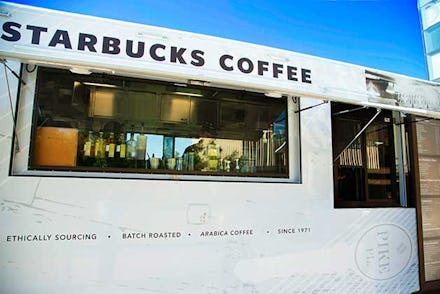Food Truck Movement Reaches Its Natural Conclusion With Starbucks Coffee Trucks

As if you needed a closer Starbucks.
The coffee giant announced plans to partner with three colleges around the country — Arizona State University, James Madison University and Coastal Carolina University — to provide sleepy college students with mobile, on-the-go caffeine fixes.
Bloomberg Businessweek reports that the trucks are intended to increase the company's visibility among the much-desired demographic. Aramark, the food service provider that will operate the trucks, conducted a survey of its customers and found Starbucks was the most preferred brand of coffee. College kids also prefer fancy — read expensive — coffee, with 47% of students wanting to buy their beans at a specialty coffee or espresso cafe.
"A college campus was the ideal setting to test the mobile truck," Aramark spokeswoman Karen Cutler told Businessweek in an email. The truck will be able to travel around the campuses, following bleary-eyed students with caffeine-infused lifeblood.
It's only natural that the food truck phenomenon has finally roped in Starbucks. With over 21,000 stores in 65 countries, it's about time we had access to a mobile version. In fact, the only question that remains might simply be, "What took them so long?"
Well, they've tried it before. The company debuted a "Frappuccino Truck" this summer, which traveled through cities in California, including Los Angeles and San Diego. That truck carried some classic Starbucks items as well as snazzier things like croquet and a jukebox, according to the Huffington Post.
Non-college students might be out of luck. Starbucks is planning on launching the trucks on a small scale, Businessweek notes, so don't get too excited yet. For now, they'll only be motoring around the three lucky schools.
However, if the experiment goes well, it may well be a sign of things to come. The Starbucks craze could be entering its next phase. And this time, it's closer than ever.